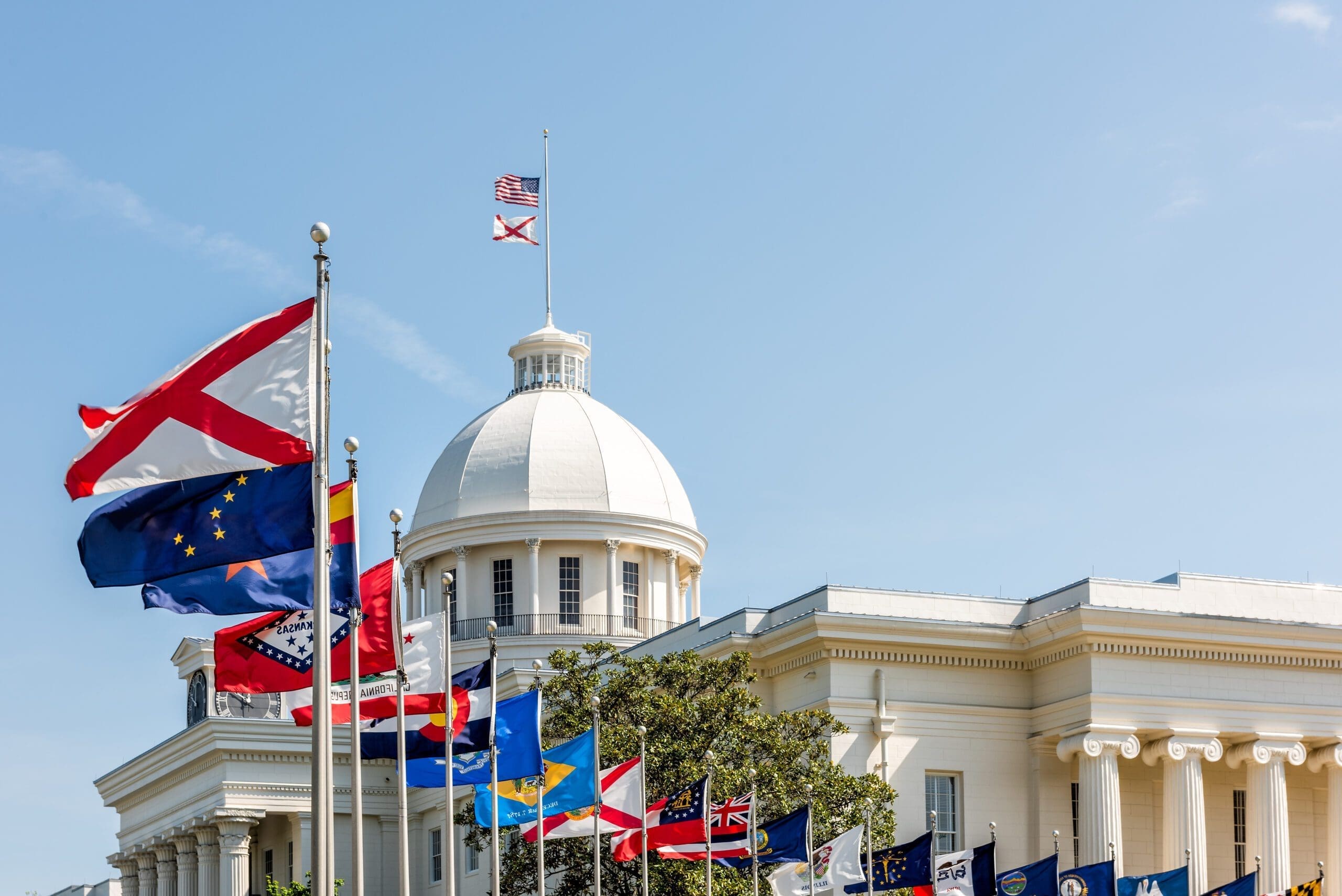As of April 26, a total of 835 bills have been filed by members of the Alabama Legislature. Of those bills, 80 have been enacted into law, and over 100 others have been sent to Gov. Kay Ivey for approval.
Constitutional amendments:
Changes to the Alabama Constitution must be approved by voters before they can be made part of the constitution. Amendments are usually placed on the ballot for general elections, though the vote can take place at another time if the legislature chooses.
Local amendments:
- HB24 would only affect Covington County and will put an amendment on the ballot for Alabama voters, which, if approved, would authorize the legislature “to fix, alter, and regulate court costs in the county and provide for their distribution.”
- HB40 will only affect Lauderdale County, and proposes a constitutional amendment to be put on the ballot for voters to decide, which would allow individuals 65 and older to claim a senior property tax exemption.
- HB106 only impacts Dale County, and will put an amendment on the ballot that, if approved by voters, will allow for people who are under the age of 75 to be elected or appointed as the county probate judge. Current law requires that candidates be under 70 years of age.
- HB107 will only impact Dale County, and will be on the ballot as an amendment for the Alabama Constitution. If approved by voters, it will allow municipalities in the county to allow the use of golf carts on public roads. It will also set certain requirements regarding the operation and usage of golf carts. These requirements include a safety inspection, drivers licenses for everyone driving golf carts on public roads and making sure that the golf cart is covered by liability insurance.
- SB142 will propose an amendment to the constitution, which would change the way that the Pell City Board of Education is chosen. Currently, the board is elected by residents, but if approved by voters, the amendment will change so that the city council appoints members of the board.
- SB141 will propose an amendment to the constitution to allow Pell City City Council to appoint the Pell City Board of Education members instead of electing them. Additionally, it will stop residents of Pell City from being allowed to vote in the election for the county board of education and superintendent of education.
- HB109 only impacts Houston County, and will put an amendment on the ballot that, if approved by voters, will allow for people who are under the age of 75 to be elected or appointed as the county probate judge. Current law requires that candidates be under 70 years of age.
- SB86 will propose an amendment to the constitution that would adjust the jurisdiction of the Tuscaloosa City Board of Education and the Tuscaloosa County Board of Education.
Education bills
- HB2 allows the Dallas County Board of Education to set monthly compensation for board members to a flat $1,000 per month. This will be given instead of their current compensation and expenses. The standard compensation for county board members in Alabama is $7.50 per day plus all travel and hotel expenses incurred while conducting business for the board. Board members receive pay for up to 24 days out of the year.
- SB59 requires that all high school students are given hands-on CPR training and taught how to use an automated external defibrillator as part of their health classes.
Crime and punishment bills
- With the passing of HB10, if a person dies due to a fentanyl overdose, the individual who provided the substance that contained fentanyl can now be charged with manslaughter.
- The Sound of Freedom Act, HB42, sets a minimum sentencing of life in prison for anyone at least 19 years old that is found guilty of trafficking a minor.
- HB75 will make attempting to cause physical harm to a letter carrier while they are working assault in the second degree.
- HB161 will update existing laws relating to private images — private images refer to images or recordings where an individual is clearly identifiable and engaged in some form of sexual act where they could reasonably expect privacy — to include that it is a felony to edit a private image without permission or to create an artificial private image of someone without their permission.
- HB121 prohibits county and municipalities from retaliating against an employee for reporting under oath or through an affidavit a violation of a law, regulation or rule to a public body.
- HB125 has made it a felony for a member of the clergy to have sex with or engage in sexual acts with anyone under 19 years of age, regardless of consent.
- SB95 makes it a crime for anyone under 21 to possess any type of “electronic battery-powered device capable of being used to deliver any e-liquid, e-liquid substitute, tobacco, CBD oil, THC oil, herbal extract, or nicotine salt, or any analog thereof, or any other substance to the individual through the inhalation of vapor.”
- HB127 makes it a felony for anyone to tamper, destroy or damage any device used to monitor someone under electronic monitoring by the Department of Corrections.
- SB63 limits the liability of county commissions for how public funds are spent when the funds are being used at the discretion of a single public official.
- HB168, known as the Alabama Child Protection Act of 2024, makes several changes to current laws regarding the possession of child pornography. Among the changes, the law raises the age that content is considered to be of a child from 17 to 18. It also states that created images, such as ones made using ai that might be virtually indistinguishable from a real person, are still considered child pornography.
Medical bills
- HB69 amended the code of Alabama Section 20-2-214 to give access to the controlled substances database to up to two employees of a licensed dentist, who is authorized to provide controlled substances to patients, so that they may access it on the dentist’s behalf.
- HB70 allows dentists who are not licensed in Alabama, but do hold licenses from other states, to acquire volunteer licenses for a limited period of time when practicing as part of a charitable event. Dentists awarded a charitable license must practice under the supervision of a dentist licensed in Alabama.
- HB71 will make emergency medical services personnel eligible for hazardous duty time in their retirement plans.
- HB126 requires that firefighters, fire protection personnel and emergency medical services personnel be trained regularly to interact with people who have invisible disabilities or special sensory needs.
Tax and governance bills
- HB156 exempts candidates for municipal offices from filing campaign finance reports until they either receive contributions or spend more than $1,000.
- HB15 established rules requiring the Commissioner of the Department of Conservation and Natural Resources to issue permits to businesses or municipalities to introduce black bass into the Coosa River as long as they fulfill the requirements established in the act. The entity obtaining the bass must get them from a local, state approved fish hatchery, can only be certain sub-species of bass and the entity must bear the full costs for transportation, purchase and introduction of the bass to the Coosa. The act does not stop the commissioner from denying permits due to “environmental, pathogenic, or biological factors or for the protection of public health and welfare.”
- HB87 gives airports the right to form partnerships with other entities related to airport operations, land acquisitions and any activities incidental to airport operations.
- A new bill, HB89, will change the process for selecting trustees to the Library Board of Trustees for the North Shelby Library District. The district encompasses two libraries, North Shelby and Mt. Laurel, and is a 501-c-3 non-profit. It was created in 1988 by the state legislature and a majority by local residents. All residents and local businesses are required to pay a yearly fee to support the library. Previously, residents elected the members of their library board to serve four-year terms. Now, board members will be appointed by the members of the Alabama legislature that represent Shelby County.
- HB101 adds to the list of election expenses that can be reimbursed to counties by the state. The added items include training costs, electronic voting machine cost and facility rental fees.
- HB187 extends the deadline for electing pass-through entities to file the necessary forms announcing whether they’d like to be taxed as an electing pass-through entity.
- HB196 rewrites sections of the code of Alabama relating to the sale of certain tax delinquent land. The law authorizes the Land Commissioner to sell certain lands and grants the ability to make the sales through online public auction.
- HB138 appropriates funds from the American Rescue Plan Act — State Small Business Initiative Fund to be used by the Alabama Department of Finance.
- HB164 will require websites that provide pornographic material to use some form of age verification to restrict their site from minors and will levy an additional tax from pornography sites starting in 2025. Funds generated from this tax will be distributed to the Department of Mental Health. Additionally, starting in October, these websites will have to post several notices from Alabama Health and Human Services on their homepage, and must include a notice for the U.S. Substance Abuse and Mental Health Services Administration Helpline on every page of the site.
Sunset bills
Several agencies in Alabama are subject to the Alabama Sunset Law, which means that they are routinely reviewed by a committee that recommends whether they should be allowed to continue or terminated. This process continues unless a bill is passed removing them from this review process.
- SB147 allows the Public Service Commission to continue to exist and function at least Oct. 1, 2028.
- SB146 allows the Board of Examiners of Assisted Living Administrators to continue to exist and function until at least Oct. 1, 2026.
- SB145 allows the Alabama Board of Examiners in Counseling to continue to exist and function until at least Oct. 1, 2026.
- SB144 allows the Alabama Board of Examiners in Psychology to continue to exist and function until at least Oct. 2028.
- SB140 allows the Alabama Professional Bail Bonding Board to continue to exist and function until at least Oct. 1, 2025.
- SB139 allows the Alabama Board of Cosmetology and Barbering to continue to exist and function until at least Oct. 1, 2028.
- SB138 allows the State of Alabama Plumbers and Gas Fitters Examining Board to exist and function until at least Oct. 1, 2028.
- SB133 allows the Alabama Securities Commission to continue to exist and function until at least Oct. 1, 2028.
- SB132 allows the Alabama Board of Social Work Examiners to continue to exist and function until at least Oct. 1, 2028.
- SB130 allows the Alabama Board of Court Reporting to continue to exist and function until Oct. 1, 2028.
- SB127 allows the Alabama Athletic Commission to continue to exist and function until at least Oct. 1, 2027.
- SB126 allows the Alabama Liquefied Petroleum Gas Board to continue to exist and function until at least Oct. 1, 2028.
- SB125 allows the Alabama State Board of Public Accountancy to exist and function until at least Oct. 1, 2028.
- SB124 allows the Alabama Security Regulatory Board to exist and function until at least Oct. 1, 2027.
- SB123 allows the State Board of Auctioneers to continue to exist and function until at least Oct. 1, 2028.
- SB121 allows the Alabama Real Estate Commission to exist and function until Oct. 1, 2028.
- SB118 allows the Alabama Private Investigation Board to exist and function until Oct. 1, 2026.
- SB117 allows the Alabama Electronic Security Board of Licensure to continue to exist and function until Oct. 1, 2028.
- SB115 allows the State Licensing Board for General Contractors to continue to exist and function until Oct. 1, 2027.
- SB114 allows the Alabama Real Estate Appraisers Board to continue to exist and function until Oct. 1, 2028.
- SB113 allows the Alcoholic Beverage Control Board to continue to exist and function until Oct. 1, 2028.
- SB111 allows the Board of Heating, Air Conditioning and Refrigeration Contractors to continue to exist and function until at least Oct. 1, 2028.
- HB139 removes the Department of Insurance from review under the Sunset Law.


